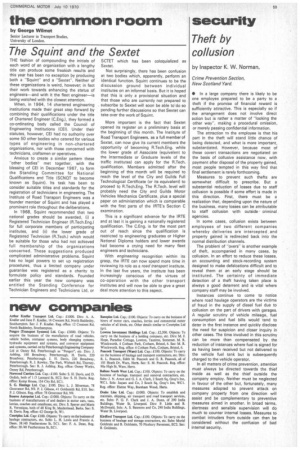security
Page 61

If you've noticed an error in this article please click here to report it so we can fix it.
Theft by collusion
by Inspector K. W. Norman,
Crime Prevention Section, New Scotland Yard.
• In a large company there is likely to be one employee prepared to be a party to a theft if the promise of financial reward is sufficiently attractive. This is especially so if the arrangement does not involve direct action but is rather a matter of "looking the other way", making a procedural omission, or merely passing confidential information.
The attraction to the employee is that his part in the theft will stand little chance of being detected, and what is more important, substantiated. However, because most of these covert transactions are negotiated on the basis of collusive assistance now, with payment after disposal of the property gained, most people tempted in this way find that final settlement is rarely forthcoming.
Measures to prevent such thefts are somewhat difficult to prescribe. But a substantial reduction of losses due to staff collusion is possible if some effort is made in this direction. First, there must be a realization that, depending upon the nature of the business, many losses can be attributable to staff collusion with outside criminal agencies.
In some cases, collusion exists between employees of two different companies whereby deliveries are intercepted and property gained is redirected back into the normal distribution channels.
The problem of "overs" is another example of theft, accompanied in many cases, by collusion. In an effort to reduce these losses, an accounting and stock-recording system designed to make defalcations difficult and to reveal them at an early stage should be instituted. The certainty of immediate detection of a theft having taken place is always a good deterrent and is vital where company staff may be involved.
Instances continue to come to notice where road haulage operators are the victims of fraud in the supply of diesel fuel due to collusion on the part of drivers with garages. A regular scrutiny of vehicle mileage, fuel consumption and fuel bills would tend to deter in the first instance and quickly disclose the need for suspicion and closer inquiry in other cases. The time involved in this scrutiny can be more than compensated by the reduction of instances where fuel is signed for as having been received but not delivered to the vehicle fuel tank but is subsequently charged to the vehicle operator.
In all matters of crime prevention, attention must always be directed towards the thief inside as well as the thief outside the company employ. Neither must be neglected in favour of the other but, fortunately, many measures adopted to prevent attack on company property from one direction will assist and be complementary to preventive measures aimed in another. In broad terms, alertness and sensible supervision will do much to counter internal losses. Measures to combat intruders from outside can then be considered without the confusion of bad internal security.












































































































